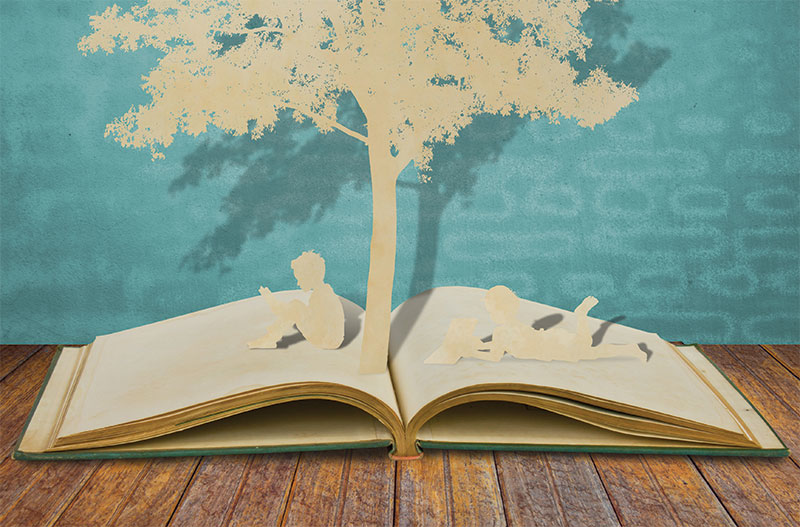Education is not the same as schooling. The role of the family, the group of friends, the community, the church, and so on must harmoniously complement the school’s role in this process. However, in the end, anyone who wants to succeed in life will work on their personality and self-education.
“Our time is an extraordinary time—not ordinary—in two respects. First, because… it is a time full of witches and charlatans. The Enlightenment had largely discredited them, and therefore, for more than two centuries, Western civilisation had marginalised them. Now they are resurrected and triumphant. They also triumph because we are increasingly accelerating and fleeing forward. And this is the second characteristic—the truly unprecedented one—of our time.” (Giovanni Sartori, Homo videns—translated from Italian)
Real-life situations: An aspiring actress is presented with her “mentor’s” vision of the life of a real, complete actor—to get into character as well as possible, you have to live intensely, go through what the heroes go through, and feel what they feel; this is how you walk in their shoes… But how far should you go? you wonder naturally—because between Joan of Arc and Dulcinea del Toboso there’s an ocean of vantage points.
Behind the scenes: A young woman preparing for a television career is asked an ambiguous question: “Are you motivated enough, would you do anything to reach your goal?” Even more unclear are some “philosophies” of success in art: some artist “mentors” claim that inspiration can only come through certain mind-numbing stimuli, legal or illegal, and this lifestyle shared with disciples seems to them to be the mark of any genuine artist, and also the reason why their genius is incomprehensible to society or family. Their cultural justifications go as far as the German philosopher Nietzsche’s Übermensch.

Changing the scene, we find an “experienced” editor who advised some students who were writing a specialised magazine “to prostitute themselves in order to receive funding” after publishing some poor-quality material. Another editor omitted to pay for the translations of some poor students who could barely afford food.
In the university world, we find a plagiarist professor who makes a written agreement with the ghostwriter that, in the event that he denounces her, he will pay her a large amount of compensation (not realising that she is self-incriminating). Another plagiarist defies an entire academic community by claiming that he doesn’t even need the fraudulently obtained degree, even though losing it would exclude him from that community.
Different masks, same stake: a paranormal therapist charges exorbitant sums for “sacrotherapy” courses, where she teaches students how to pray to get what they want. An entrepreneur convinces clients to enter a pyramid scheme. They will never recover their initial investment, but he and those at the top of the pyramid get rich. A discreet and prosperous gentleman reveals to a student the secret of his success—the clandestine organisation that supports him—but hides the true price: freedom of conscience, or purity of conscience.
A boss convinces a poor young woman not to take a better-paying job only to fire her afterwards, declaring that at his firm people leave “by being fired, not by resigning.” An influential man of culture refuses the request of some bona fide competent young people to help morally rehabilitate society by creating a civil society organisation. His lazy immobility is all the more unfortunate because he doesn’t even leave room and power for others to act.
An advertising guru is repeatedly invited to lecture for a lot of money, although he confesses that he has nothing more to say to the public, who expect from him at least the formula of immortality. A high prelate collaborates with foreign debt collectors and racketeers and tolerates sinister crimes in monasteries. A young man, who became famous for his chiselled muscles, declares on the news that he is having fun and has many admirers, even if he did not get his baccalaureate, therefore he didn’t need it anyway.
A reputed doctor begins to do product placement for pharmaceutical companies, significantly filling up the prescriptions of his patients, whom he treats like customers. Another doctor recommends unnecessary procedures to patients in exchange for generous rewards from the clinics he refers them to. A member of a secret structure recruits people speculating on their patriotism or even fanaticism, so that later, when it is too late to back off, they find that they have to go through the same life experiences as the real and complete actors…
And the list can be completed by any of us.
As you can see, today’s wizards and charlatans don’t wear black capes and carry bottles of cheap elixirs anymore, but dress in smart clothes, wear gold watches, drive fancy cars, and often have an invisible safety net under their feet. The subliminal message of these anti-models is simple: “To get to the top, you have to do as I do!” We wonder where the antidote for education comes from.
“Witches” without hunters
The observations of the famous Italian thinker Giovanni Sartori about today’s flourishing quackery and the speed of perpetual change are not surprising. The problem is that these two characteristics of the contemporary world are dangerous for all of us. Many of us consider ourselves immune to them, but without daily vigilance, we could risk contaminating ourselves, and the developing generations are all the more vulnerable to the multitude of anti-models around.
What Sartori suggests with the idea of “post-thinking” is that, as a result of the intense consumption of everyday media products, our ability to reason, to relate critically and reflectively to events decreases. In other words, they affect thinking; through the lack of thinking, character and personality are deformed, and the most affected are children and young people.
When they gravitate towards anti-models, young people are not to be blamed for aiming high or for imagining in good faith that they have found in these non-values the way to get there. However, those who promote the mechanism of seduction and corruption, deliberately or implicitly, are morally (and sometimes even legally) culpable: those who tolerate it, although they should take measures (the police, justice, or ethics commissions in institutions) or those who make a profit on account of its circulation, but do not offer normality as an alternative and are not neutral (some media). It is a noticeable fact for anyone who knows the law and observes the media scandals caused by the type of situations listed at the beginning of this article.
The media seem increasingly to be abandoning their traditional role as “watchdogs of democracy”; there are authors[1] and social movements for democratic media that question the intentions of the big press companies.
We are urged to critically receive information and programs and to reprimand, especially when it comes to news, those media that promote the interests of some private parties, by distorting reality and blocking the free circulation of ideas.
By broadcasting almost exclusively negative news, omitting beneficial, remarkable events of national interest, ignoring personalities and opinion leaders with authority and good reputation, by focusing on vulgar entertainment and sensationalism, these media implicitly promote non-values. Their persistence indicates that many of these media cannot play a role in educating the public, let alone children and youth. It is up to society and each individual to remain vigilant about the situation because the problem of finding role models for a healthy education persists.
Books and the role models they can offer
Education is not the same as schooling. The role of the family, the group of friends, the community, the church, and so on must harmoniously complement the school’s role in this process. However, in the end, anyone who wants to succeed in life will work on their personality and self-education. The best way is that of the beneficial, inspiring models around them: wise parents, gentle and loving grandparents, empathetic brothers, honest friends, supportive colleagues, pious priests and pastors, and so on. But what if they don’t exist, what if they do not provide support, what if they are not good examples to follow?
You are more likely to find nobler and more valid models in books than on the street or a screen. You will no longer be alone or isolated if you discover those admirable personalities, those enlightened people who have been speaking to you directly as a friend, for so many centuries: the slave philosopher Epictetus teaches you in his Manual how not to allow evil to affect you; in Gulliver’s Travels, Jonathan Swift reveals to you the origin of the word Yahoo and the nobility of the world of horses; Dostoevsky, with a unique psychological depth, explains in The Brothers Karamazov why the masses do not want freedom; Antoine de Saint-Exupéry shows you the strength of the innocence of The Little Prince; Lewis Carroll, the logician friend of children, educates you through imagination and play, alongside Alice in Wonderland.
Jack London awakens your appetite for interaction with nature and animals such as the friendly wolf from White Fang; Jules Verne amazes you by anticipating so many later technical inventions, from the submarine (Twenty Thousand Leagues Under the Sea) to CDs (Propeller Island); Edmondo de Amicis moves you through the courage of the character in Heart and his love for his father who has gone far away; Carlo Collodi shows us the trials that Pinocchio goes through until he starts listening to his conscience; in A Christmas Carol, Charles Dickens reveals to you treasures of wisdom and kindness in the humblest of people; Goethe warns you, in Faust, not to sell your soul to the devil; and the Bible teaches you all this and more, for your good and for an eternal destiny.
From models to the Model
Even the most disadvantaged students nowadays, if they cannot afford other books or do not have the time or social conditions to educate themselves, even if they drop out of school, can have access to the Book of Books. Thus, the chance to educate themselves remains valid and within their reach. And so is the strength to do this, because, as the apostle Paul says, “All Scripture is God-breathed and is useful for teaching, rebuking, correcting and training in righteousness” (2 Timothy 3:16).
What makes the Book of Books unique from all the others is precisely this inspiration; it is education by privileged means: revelation, a way of God to address the souls of those who become His children. Of all the books, only the Bible provides the universal tool to discern between good and evil, nourishes the soul and forms the backbone of character. What are the shortcomings or dangers of forming your culture without the Bible’s guidelines? Neurosurgeon Ben Carson, in a confession about his childhood, confesses that he had become a monster of arrogance. Bovarism is another trap—the desire to live in fiction. Another danger is a culture without moral or intellectual criteria, like the character in Jean-Paul Sartre’s novel Nausea, the Autodidact. Models in books cannot be perfect. The models contained in the pages of the Bible are refreshing, however, because of the consistency between words and deeds, between character and the reaped fruits.
Neurosurgeon Ben Carson, in a confession about his childhood, confesses that he had become a monster of arrogance. Bovarism is another trap—the desire to live in fiction. Another danger is a culture without moral or intellectual criteria, like the character in Jean-Paul Sartre’s novel Nausea, the Autodidact. Models in books cannot be perfect. The models contained in the pages of the Bible are refreshing, however, because of the consistency between words and deeds, between character and the reaped fruits.
And this is not only in the eyes of people, but even in the eyes of God: the purity of Enoch’s life brought him immortality; Job’s righteousness was worth more than the decay of the whole world; Abraham’s faith brought him righteousness; Moses’ humility made him the leader of a people; Joseph’s innocence resulted in the salvation of his people; the spirit of Elijah also gave power to other prophets; and John the Baptist became the greatest of men.
Above all, with His human side, Jesus Christ provides the perfect, unshakeable model, the ideal personality to aim for and rely on. He is the true Axis Mundi, through the axis of the Cross that connects earth to Heaven.
Corina Matei is a PhD lecturer at the Faculty of Communication Sciences and International Relations of the “Titu Maiorescu” University, Bucharest.



















